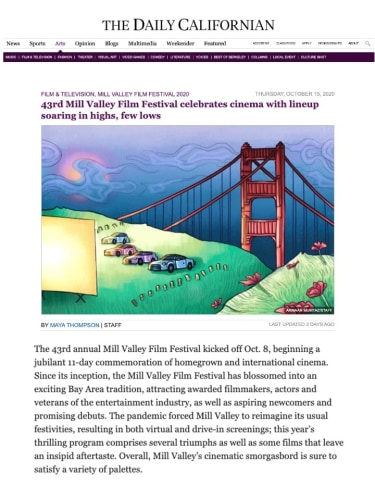43rd Mill Valley Film Festival celebrates cinema with lineup soaring in highs, few lows
The Daily Californian
10/15/2020
Back
FILM & TELEVISION, MILL VALLEY FILM FESTIVAL 2020
By Maya Thompson
The 43rd annual Mill Valley Film Festival kicked off Oct. 8, beginning a jubilant 11-day commemoration of homegrown and international cinema. Since its inception, the Mill Valley Film Festival has blossomed into an exciting Bay Area tradition, attracting awarded filmmakers, actors and veterans of the entertainment industry, as well as aspiring newcomers and promising debuts. The pandemic forced Mill Valley to reimagine its usual festivities, resulting in both virtual and drive-in screenings; this year’s thrilling program comprises several triumphs as well as some films that leave an insipid aftertaste. Overall, Mill Valley’s cinematic smorgasbord is sure to satisfy a variety of palettes.
“Blithe Spirit”
On opening night, Mill Valley welcomed attendees to a drive-in screening and world premiere of “Blithe Spirit.” Adapted from Noel Coward’s comedy, the film centers on the wealthy, white socialites Charles (Dan Stevens) and Ruth Condomine (Isla Fisher). Hoping for screenplay inspiration, Charles invites the dubious medium Madame Arcati (Judi Dench) to conduct a seance in their home, inadvertently summoning the ghost of Charles’ first wife, Elvira (Leslie Mann).
Stevens and Fisher are fine, if forgettable; Dench, however, offers the most enjoyable performance, overcoming the droning pretension stilting the script. Mann, unfortunately, cannot say the same — although it is difficult to tell if blame lies with her one-note performance or the archaic ideals her character amalgamates. The 2020 “Blithe Spirit” lacks contemporary consciousness, performing racial exoticism and rooting its central conflict in women competing against one another for a man’s attention. While the film’s ending departs from its source material, the belated lurch toward self-awareness is too little, too late.
“The Truffle Hunters”
“The Truffle Hunters” composes a pastoral, poetic portrait in the forests of Northern Italy. The documentary follows a cluster of idiosyncratic old men and their canine companions as they scour the woods for the rare white Alba truffle — the prized white whale of their trade. Directors Michael Dweck and Gregory Kershaw open an exquisite, captivating window into the truffle hunting system, aligning their narrative sympathies with the aging hunters who dignify the dying trade.
The immersive and inventive cinematography in “The Truffle Hunters” transcends expectations for documentary filmmaking, reveling in lush aerial landscapes as well as playful shots from the perspective of the dogs trekking nose-first into the forest. The film underscores its romantic vignettes with sobering observations about the artisanal craft’s changing frontier. Today, truffle hunting ripens with insidious competition between hunters, and it’s hard to ignore the class fissures distinguishing the humble life of the laboring truffle hunters and the lavish spectacle entertaining the product’s patrons.
The documentary’s contemplative, observational storytelling elicits emotion in a slow and steady trickle, swelling to fill a profound impression that wholly washes over viewers only after the credits have rolled.
“Ammonite”
The festival’s drive-in screening of “Ammonite” began with a swift, inspiring inauguration from the film’s star, Kate Winslet. Winslet’s promising preface, compounded by director Francis Lee’s triumphant queer storytelling in “God’s Own Country,” sets the stage for an evocative, refreshing love story. Instead, “Ammonite” delivered a film as listless as the extinct mollusks of its moniker.
The film follows Mary Anning (Winslet), a famed British paleontologist, who lives a lonely life with her ailing mother (Gemma Jones) and searches the sunless coastline for fossils. The arrival of Roderick Murchison (James McArdle) and his young wife Charlotte (Saoirse Ronan), however, disrupts Mary’s solitude, as Roderick entrusts her to look after Charlotte while he is away. Mary and Charlotte grow to find comfort in each other’s company and eventually embark on a clandestine, consuming affair.
Lee colors the Lyme Regis coast in cool navies, steel grays, blanched beiges — it’s a bleak, harsh world that calcifies biography into still life. Winslet, to her credit, displays mastery in subtlety and control, her countenance minute yet compelling. Ronan also keeps her performance afloat, but the film leaves dialogue to drown. As in “God’s Own Country,” Lee prefers to show rather than tell; “Ammonite,” however, shows a washed-out seascape with incessant rustling, tapping and sloshing. At some point, the thrashing waves sound more like TV static. While the consistent aesthetic drive is admirable, “Ammonite” seems depressed and disappointed by its own milieu, fossilizing an aching heart in stone.
“Charlatan”
Polish director Agnieszka Holland traces the enigmatic life of Czech healer and herbalist Jan Mikolášek in her new biographical drama “Charlatan.” Ivan Trojan, a Czech titan, seizes the leading role in a grave, leaden performance. The film flits between Mikolášek’s past and present, enlisting Trojan’s son Josef to play the angst-ridden, violent teenager who discovers his penchant for homeopathic healing.
“Charlatan” significantly fictionalizes Mikolášek’s life, but nonetheless tells a compelling tale that makes space for both sides of the controversy, exhibiting Mikolášek’s blatant medical fabrications as well as his uncanny talent for diagnosis.
The film is unflinchingly dark; the few reprieves come from František Palko (Juraj Loj). In a subdued queer romance, Palko provides Mikolášek with unwavering loyalty — even overlooking the healer’s morally bankrupt actions — although their romance occasionally flickers from narrative neglect. The film’s fascination with its flawed protagonist eclipses its own imperfect execution, making “Charlatan” a captivating and haunting watch.
Honorable mentions: “The Father,” “I Carry You With Me,” “This Is Not a Burial, It’s a Resurrection” and “Spring Blossom.”
The 43rd Mill Valley Film Festival runs from Oct. 8-18.